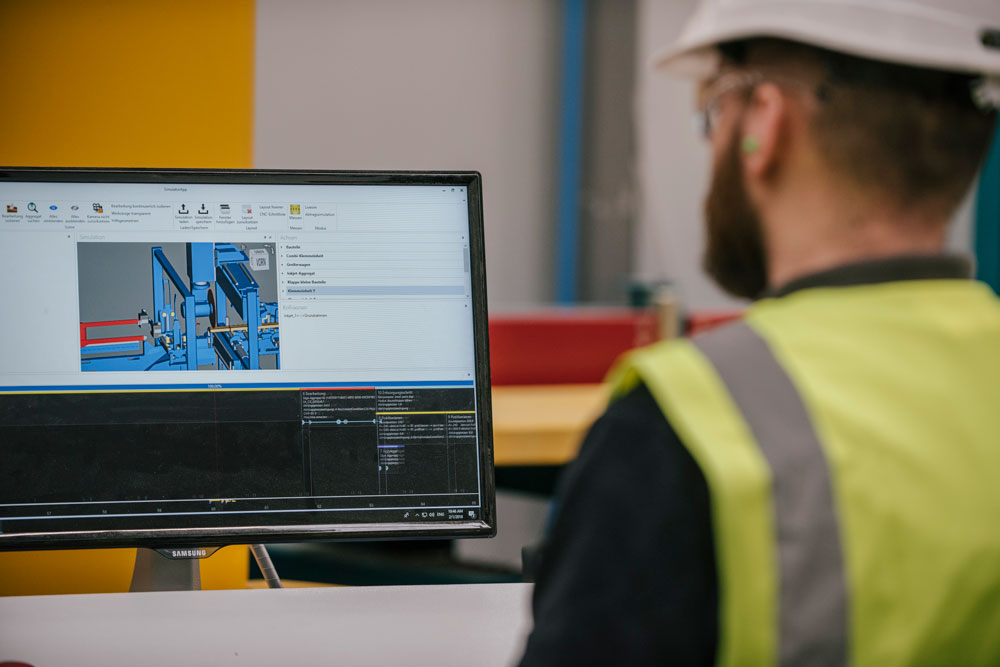What is MMC?
Modern methods of construction (MMC) use offsite manufacturing to build high quality homes faster, with less waste, helping to tackle the nation’s housing shortage and provide homes that people love.
The Government drive around MMC
In 2020, then housing secretary Robert Jenrick said that he, chancellor Rishi Sunak and the chief secretary to the treasury Stephen Barclay were “hugely supportive” of using modern methods of construction to build homes.
The government has made it a condition of their £11.5bn affordable homes programme that at least 25% of those homes should be manufactured through modern methods.


The Government’s new Modern Methods of Construction (MMC) Taskforce, backed by £10m of seed funding, aims to accelerate the delivery of offsite homes across the UK, working closely with housing associations and local authorities to achieve this.
- Faster delivery. While some elements of the development process (such as planning) remain the same whatever the type of construction, the ability to pre-manufacture elements away from site can generate significant programme savings. Estimates for this vary, but around one third to one half of the construction period itself can currently be eliminated by utilising MMC systems.
- Faster delivery of homes/income/return on investment. The natural consequence of shorter programme times is that homes are available to use sooner. This means residents can be housed sooner and that the investment in new homes can be recouped through rent sooner. This latter point is a key reason behind MMC being used widely in the Build to Rent and Student Accommodation sectors, where the initial investment in construction can be realised sooner by the institutional investors who build and own the homes, meaning they can develop more homes more quickly using MMC. The same logic and benefit will apply to affordable housing providers, who are building to own and rent an asset.
- Quality. An assembly led manufacturing process can help to alleviate the potential for poor oversight of build and appropriate supervision that can happen in traditional construction. Employees are easier to oversee when they are completing tasks at a consistent workstation, supervision is easier to achieve as one inspector can monitor many builds, and a factory setting with permanently employed staff means that training and competency in workers is easier to control. Clear checking points in an assembly line are easier to sign off for quality assurance, for example confirming the presence and proper installation of fire barriers.
- The construction workforce. There is insufficient capacity within the construction industry in its current form to significantly increase the volume of homes it delivers. The industry is amid a skills shortage which is affecting both the volume and the quality of homes being delivered. This has been demonstrated most recently by reports showing that 46% of skilled foreign construction workers have been lost as a result of Brexit and the Covid crisis. MMC utilises a largely different workforce to traditional construction, encouraging the sustainability of the sector and the clean factory-based working conditions have been shown to be effective in attracting a new demographic to the industry and diversifying the workforce.
- Funding. Government policy has been moving to a position of support for MMC for at least the past five years and this is now most visibly seen in the requirement of Homes England (HE) that strategic partners deliver 25% of their programme as MMC, and more generally in both HE and the Greater London Authority (GLA) encouraging all bidders to consider MMC as an option on sites.
- Costs come down over time: the procurement process has been set up in a way to rigorously test and find the partners that will drive efficiency through the course of the framework, thereby reducing costs over time. VfM is also driven by the early engagement made possible through the Framework Alliancing Contract, which all stakeholders will be signed up to and which will reflect the shared objectives.
- Members will be supported with comparing Building Better schemes with traditional construction as an additional check and balance.
- VfM will not only be captured through the build process but also be evidenced by fewer defects, a better standard of homes for people to live in and a reduced carbon footprint.
In 2019, a MMC definition framework was developed by a government and industry working group on MMC. It covers seven MMC Categories.
The framework was developed to regularise the term ‘MMC’ by defining the broad spectrum of innovative construction techniques being applied in the residential market.
Category 1 – Pre-Manufacturing – 3D primary structural systems
Category 1 volumetric, three dimensional ‘boxes’ are manufactured in factories and delivered to site. Typical systems include timber, steel or cross laminated timber (CLT). This category has the highest level of pre-manufacture.
The Category 1 segment of the offsite market is more mature than some other categories. There are a number of large-scale Category 1 factories in the UK that have already been delivering residential MMC homes for some years.
Category 2 – Pre-Manufacturing – 2D primary structural systems
These are two dimensional panelised systems, manufactured in factories and assembled onsite to form a structure.
There are many differences within 2D categories: standard timber, cross laminated timber (CLT), steel, structural insulated panels and hybrid systems.
Category 2 systems have the ability to be manufactured to a client’s own individual designs and house types. They can provide bespoke solutions to sites that might already have planning, without housing organisations having to go back to the drawing board. 2D panelised systems are also easier to transport so they are more suitable for sites with access issues.
The Category 2 segment of the offsite market is evolving rapidly with new products and manufacturers emerging all the time.
Category 3 – Pre-Manufacturing – Non systemised structural components
This includes the use of pre-manufactured components to form part of the structure of a building, mostly made from timber or concrete.
Typical types of Category 3 MMC components are driven or screw piles, pre-fabricated pile caps or ring beams, columns, walls and/or beams, floors, integrated columns and walls and beams, staircases and roofs.
Category 4 – Pre-Manufacturing – Additive Manufacturing
This type of MMC solution relates to the 3D printing of parts of buildings and it can be done remotely or onsite.
Although this form of MMC is not available for widespread use in construction projects currently, it is expected to be in the future.
Category 5 – Pre-Manufacturing – Non-structural assemblies and sub-assemblies
Category 5 covers pre-assembled components that do not form the structure of a home and can be used in isolation in an otherwise traditionally constructed project.
There are two main types of MMC Category 5: 3D components such as pods and 2D components such as façades, floors and walls.
Category 6 – Traditional building product led site labour reduction/productivity improvements
This category comprises traditional building materials that have evolved so that they are quicker, easier and safer to install. They are either large format versions of traditional materials, or materials that have been developed to be easier to install with less reliance on onsite labour.
Category 6 solution types include internal walls, external walls, roofing finishes, materials that have been specifically cut to size, e.g. pre-sized plasterboard and also materials that have been adjusted to be easier to install, e.g. brick slips.
Category 7 – Site process led labour reduction/productivity improvements
This includes the use of systems and processes onsite to drive productivity by removing unnecessary work stages, enabling better and faster installation and improving health and safety.
Examples include measures to encapsulate a site to secure weather-proof conditions, standardised temporary work (e.g. a modular scaffold), use of BIM connected to onsite workflows, visual aids such as AR or VR, physical aids such as exoskeletons and productivity tools such as GPS.
Click here for more information on all seven MMC Categories.
The short answer is no as it depends on a number of factors. There has been a huge reduction in capital costs over the past decade and these will continue to come down, as our pipeline grows bigger and longer.
We know the real cost reduction is in improved quality, but there is little data backed evidence of this. Building Better will continue to collect and investigate means to link the capital cost of new development to ongoing costs of housing management, maintenance and service charges.
In principle, no. In fact, with the use of Building Information Modelling (BIM) and other digital technologies which are inherent in the manufacturing process, repairs and renovations could become proactive, more efficient and less intrusive.
In practice, our asset management teams need to be involved in the development process from the beginning to ensure repairs are not attempted in the same way as would be the case with a traditional brick / cement structure.
The biggest challenge is around insurance and the risks associated with
- Design – for example, how materials respond to fire and how firefighters might respond to the materials, such as flooding with water and creating content damage
- Habitation – how people use the home requires understanding of how structures are different from traditional brick
This is a myth, which has been busted since the market moved on from pre-fab buildings made in the post WWII era. It is possible to standardise performance, processes and even layouts but still retain differences in how homes look on the outside.
In fact, the more we standardise across defined criteria, the greater the ability to customise additional elements.
A closely controlled factory environment allows complete control and assurance over quality management. Some manufacturers have modelled how these practices lower future costs, however, there is simply not the volume of homes to prove this point.
Given the lack of repeatable and scalable evidence, Homes England has launched an in depth study in addition to independent research projects such as Homegroup’s Innovation Village in Gateshead.
Building Better members used the procurement process to compare manufacturers on both capital costs and evidence of improved quality via metrics such as Energy Performance Certificate (EPC) and Standard Assessment Procedure (SAP) ratings and air tightness.
Delivering operational net zero carbon homes at scale is a priority for many housing providers and a key driver behind the use of MMC.
The carbon footprint of traditional construction is substantial and MMC helps housing organisations to build greener homes in greener ways.
Embodied carbon emissions are reduced through quick, precise manufacturing processes, wider use of recycled materials, minimal waste, reduced lorry deliveries and less travel for workers all help to reduce the carbon emissions of MMC homes.
Noise and vehicle pollution are also significantly reduced – offsite homes can be completed up to 30% faster than traditional – and that also means there’s less disruption for residents.
Most MMC homes are ‘fabric first’ so they use high performance, long-lasting materials for maximum insulation and ventilation and they require less energy to run. This cuts operational carbon emissions, and it also lowers the cost and carbon footprint of future asset management. Technology gathers data about the condition of materials and products from the moment MMC homes are assembled and this, too, helps to reduce downstream maintenance.
Crucially, with energy costs surging, the thermal efficiency of offsite homes has never been more important. Electricity bills in MMC houses and apartments are significantly lower and one manufacturer recently launched ‘Zero Bills’, the UK’s first home to guarantee residents zero energy bills.
